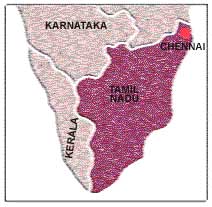Green university
 there is no cacophony of speeding two-stroke motorbikes, the ambience is serene and there is an abounding greenery that pleases the eyes. Self sustained with water, the zone is tobacco-free. This is not an ashram or a place of worship, but the Anna University campus in Chennai. One of the premier institutions in the country, the university is making all efforts to develop its campus into a sustainable and environment friendly one with minimised pollution by the end of 2001.
there is no cacophony of speeding two-stroke motorbikes, the ambience is serene and there is an abounding greenery that pleases the eyes. Self sustained with water, the zone is tobacco-free. This is not an ashram or a place of worship, but the Anna University campus in Chennai. One of the premier institutions in the country, the university is making all efforts to develop its campus into a sustainable and environment friendly one with minimised pollution by the end of 2001.
Vice chancellor of the Anna University A Kalanidhi is personally supervising the activities to ensure a pollution free environment within the campus and thereby create a healthy atmosphere for the students to concentrate on their studies. So much committed to the cause is he that even for trimming the branches of trees vc' s approval is required.
As a first step, parking slots have been earmarked within the campus so that traffic congestion gets reduced. Entry of auto rickshaws beyond a certain limit is banned. The authorities plan to restrict the entry of vehicles with two-stroke engines, which have a higher emission rate. These measures would help in controlling the vehicle emissions as well as noise pollution to a large extent, the vc says.
The authorities have planned to increase the green belt area within the campus which includes gardening and tree planting, including planting of 5000 coconut trees along the periphery. The barren lands in the campus will be converted to grass or flower patches and vegetable gardens. A five acre vegetable garden planned within the campus will cater to the daily requirement of the hostels and staff quarters. Organic farming will be practised in this vegetable garden. The vc feels that increase in vegetation cover within the campus will act as a carbon dioxide sink. As a pilot study Kalanidhi himself has started organic cultivation of vegetables in his kitchen garden.
At present the gardens consume nearly 1.5 lakh litres of water per day, and the forthcoming plans to green the campus will need an additional amount. But the university is ready to manage this by recycling water that drains from the hostels and laboratories and reusing it. The institution has set up its own sewage treatment plant to treat the sewage water (four lakh litres per day) and reuse it for gardening purpose. In this way they are able to reduce the fresh water consumption.
The university has also taken up rainwater harvesting on a large scale and introduced percolation pits of 3m
Related Content
- Interconnected disaster risks: Turning over a new leaf (2025 report)
- Order of the National Green Tribunal regarding protection of Laxmi Tal, Jhansi, Uttar Pradesh, 30/04/2024
- Report on behalf of Pune Municipal Corporation (PMC) on the use of enzyme Draynzyme to clean waterbodies, 04/04/2024
- Climate finance for powering healthcare
- Social protection and climate change in Asia and the Pacific
- Report filed by the Kayalpattinam Municipality on legacy waste management, 09/11/2023
